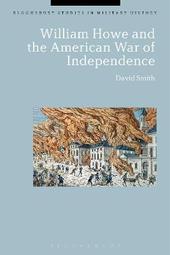
|
William Howe and the American War of Independence
Hardback
Main Details
| Title |
William Howe and the American War of Independence
|
| Authors and Contributors |
By (author) David Smith
|
| Series | Bloomsbury Studies in Military History |
|---|
| Physical Properties |
| Format:Hardback | | Pages:208 | | Dimensions(mm): Height 234,Width 156 |
|
| ISBN/Barcode |
9781472585356
|
| Classifications | Dewey:973.3092 |
|---|
| Audience | |
|---|
|
Publishing Details |
| Publisher |
Bloomsbury Publishing PLC
|
| Imprint |
Bloomsbury Academic
|
| Publication Date |
12 March 2015 |
| Publication Country |
United Kingdom
|
Description
The first major work on this enigmatic British general for more than 40 years, William Howe and the American War of Independence offers fascinating new insights into his performance during the revolution in America. From 1775 to 1777, Howe commanded the largest expeditionary force Britain had ever amassed, confronting the rebel army under George Washington and enjoying a string of victories. However, his period in command ended in confusion, bitterness and a parliamentary inquiry, because he proved unable to crush the rebellion. Exactly what went wrong has puzzled historians for more than 200 years. For most Howe has been relegated to the role of a bit player, but, with the help of new evidence, this book looks afresh at his army, his relationships with key military and political figures and his own personal qualities. The result is a compelling reassessment of a forgotten general that offers a new perspective on a man who won his battles, but could not win his war.
Author Biography
David Smith is a lecturer on the Military History MA programme at the University of Chester, UK. He is the author of Sherman's March to the Sea 1864 (2007) and New York 1776 (2008).
ReviewsSmith has pried open and given readers a view into some small part of Howe the general. His analysis is careful and rigorous. Smith has made an important contribution to the field. Students of the American War of Independence would do well to read and will profit by this book. * H-War * Historians agree that General Sir William Howe had the best chance of all of George III's commanders to crush the American Revolution. Despite Howe's importance, he remains an enigma, and he has gone without a detailed biographical treatment for more than four decades. David Smith has breathed new life into a subject shunned by other scholars by discovering an earlier draft of the defense Howe offered the House of Commons to justify his conduct in America. Relying on this revealing find, other archival sources, and the recent wave of groundbreaking research on the British Army in the American War of Independence, William Howe and the American War of Independence offers a perceptive reevaluation of Howe's generalship. Smith's work is destined to carve a prominent niche for itself in a crowded and competitive field - early American military history. * Gregory J. W. Urwin, Professor of History, Temple University, USA * Britain's defeat in the American War of the Independence and the subsequent loss of the colonies was a seismic event for late eighteenth century British history. The war and the consequences for Britain's empire have over the years attracted much comment by historians. This historiography has, however, shied away from examining the generalship of arguably the most notable of George III's commanders and certainly the one who possessed in 1776 the best opportunity to defeat the rebellion, Sir William Howe. In this path-breaking contribution, David Smith offers a revaluation of the Sir William's Howe's conduct during the war based upon not only a wealth of archival research in Britain and America but also upon a newly found document, a draft of Howe's defence to the House of Common's enquiry into his performance in America. By examining Howe's generalship in the wider context of his military experience and education as well as his command relationships and decisions in-theatre, Smith shows Howe to be a competent but unlucky general whose reputation was diminished mainly by his inability to provide a compelling account for his political masters. This work thus provides an original contribution to military history in addition to serving as a parable for modern military commanders. * K. A. J. McLay, Dean of the Faculty of Arts and Humanities, Canterbury Christ Church University, UK *
|